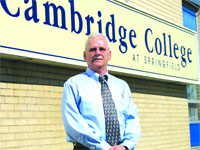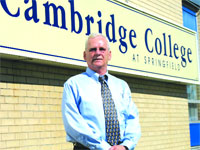
Back to School
Cambridge College Takes an Adult Approach to Learning

Richard Turner says Cambridge College excels at meeting the needs of non-traditional learners with challenging schedules.
You wont find a football team at Cambridge College, Richard Turner said. In fact, if any students ever did play, it was probably decades ago.
Thats because, since its inception in Cambridge, Mass. in 1971, the school has always kept adult learners at the center of its universe, said Turner, director of the systems Springfield campus, one of nine such regional satellites stretching from Massachusetts to Puerto Rico. That focus continues today; the average student age is 38.
And its clear, he said, that Springfield needs such a program more than ever.
To some degree, were counter-cyclical; the worse things get, the more people flock to us for training, he said, adding, however, that an oft-reported skills gap among Western Mass. job seekers has made the colleges role even more pronounced than in past economic downturns.
Im in touch with a lot of employers, and theyre starving for talent at all levels, he continued. So in a lot of ways, weve become talent brokers. Someone going through career training can plug into a network here with managers looking for skilled people, and boom, theres a connection. Ive seen people get hired in the halls.
Cambridge has also long focused on diversity, both in faculty and student body, Turner added, noting that 35% to 40% of the Springfield centers students are minorities. At a time when companies throughout the Pioneer Valley are intensely focused on developing a diverse workforce, thats a critical element, too.
We think diversity is the engine of innovation, he said. You have to practice what you preach; we dont need diversity training here becase we live diversity.
Career Ladder
Certificates and degrees in counseling, education, and management are among the most popular offerings at Cambridge, and schedules are created with the needs of working students often with families in mind; some classes can be partially conducted online.
Weve had people in the military deployed to Iraq who have been able to keep up with their learning with this kind of mechanism, said Turner. And at a time of high gas prices, the blended-learning model has been very popular.
The students who enroll represent several different experiences, with one thing in common the goal of a new or enhanced career.
We get a lot of people who have progressed as far as they can in their career, and theyre bumping against an educational barrier that someone has arbitrarily set, Turner explained. Its not something they were hearing 10 or 15 years ago, but now they need a masters degree to do their job. When I started teaching, with a masters in anything, you could teach on the college level. Now you need a doctorate.
So there has been an escalation in the degree market, he continued. People who demonstrably can do their jobs are often being told that they have to go finish their education.
Some other Cambridge students are people searching for a second career, seeking a new challenge or simply recognizing that job opportunities are better in other fields.
Maybe someone got burned out in accounting and wants to be a teach in a third-grade classroom, Turner said. Talk about math experience someone who ran an accounting department coming into that classroom, thats a wonderful story.
But perhaps the most dramatic stories, he told BusinessWest, involve students who had slipped through the cracks of traditional education.
Theyve been the least-well-served, those who have not caught on anywhere else, or society has not caught onto them, but theyre very smart, very skilled, non-traditional learners, he said. When they come here, they get confidence. Many times, they dont realize who they are, and we facilitate that. Thats priceless; its one of the most rewarding things about being here, when someone is blooming, and were helping them make that change happen.
Turner had in his hand a recent front-page story from Point of View, a Springfield-based community newspaper. The article tells the story of Rafael Bones, who, partly because of family difficulties, dropped out of Commerce High School after his junior year in 1975, earned his GED, and joined the Air Force.
He forged a successful career in the service as a recruiter, but decided to return to school in recent years, earning a bachelors degree from American International College in 2004 and a masters at Cambridge College this past summer, graduating with a 3.9 grade point average. This month, he became the first-ever Hispanic human resources director at Westfield State College.
These are people who have put so many other things first, Turner said of students like the 51-year-old Bones, who earn degrees and start new, significant careers later in life. We see a lot of that.
Live and Learn
Turner has been with Cambridge College since the mid-70s and has seen enough students come through the doors to know that they dont fall into one learning style or have one set of expectations for their education.
We get exceptionally bright students who are not good fits with traditional educational models, but excel here, he said. What are the bars to entry that most educational institutions have put up? One of them is money, obviously, but another is not acknowledging differences in learning styles or in the starting places that people have.
Im a visual learner, he continued. Ive attended five different colleges and earned three degrees, but very few places have taught in a way that matched my learning style, here or abroad. We dont assume here that everyone has a left-brain orientation.
That doesnt mean, of course, that each professor doesnt have a specific teaching style. But it does mean that Cambridge College emphasizes a more interactive style of learning than the lecture-hall model in which students keep quiet and take notes. And why not, Turner asked, when the students, with years of real-world experience behind them, bring much more to the classroom than the typical 18-year-old fresh out of high school?
The students are resources, he told BusinessWest. If youre just going to stand there and lecture them for three hours, youre not going to tap into that resource. Instead of the sage on stage, were the guide by your side.
Were not everyones cup of tea, he added. If your ideal is to sit in the back of the class, listen to lectures, do quizzes and exams, and be a very traditional learner, you might not like it here but there are many places that do that, and do it well. Thats not to say we dont have traditional students, but they would succeed anywhere because the educational world is built around them. Were designing the educational piece around the person, rather than have the person fit the educational piece.
As for watching football games? Well, theres always the Patriots.
Joseph Bednar can be reached at[email protected]





